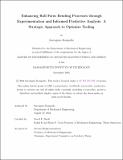Enhancing Roll Form Bending Processes through Experimentation and Informed Predictive Analysis: A Strategic Approach to Optimize Tooling
Author(s)
Kompella, Sarvagnya
DownloadThesis PDF (158.2Mb)
Advisor
Hardt, David E.
Terms of use
Metadata
Show full item recordAbstract
Sheet metal roll forming is a continuous bending process where metal strips pass through a series of rolls to achieve a specific cross-sectional profile. This technique is crucial in the automotive industry for producing high-strength, lightweight components with precision, consistency, and cost-effectiveness. This project aims to optimize Novelis’s aluminum roll forming process by employing Computer-Aided Engineering (CAE) tools, including UBECO Profil, AutoCAD, and Finite Element Analysis (FEA) software such as LS-DYNA. Initial simulations of a square tube profile identified key stations and led to performance enhancements through targeted adjustments. Stress and strain analyses demonstrated how operational factors, such as roll settings, influence section shapes and angles, facilitating the fine-tuning of roll forming station parameters. Using a Design of Experiments (DOE) framework, the study pinpointed critical factors to improve simulation accuracy and optimize roll forming settings. The results indicated that optimized stand height settings significantly improved the accuracy of the desired angles. These insights can be integrated within Novelis’ production line to boost production efficiency and roll performance. This research not only supports current operations, but also provides a foundation for future advancements in roll forming technology.
Date issued
2024-09Department
Massachusetts Institute of Technology. Department of Mechanical EngineeringPublisher
Massachusetts Institute of Technology